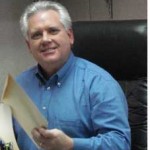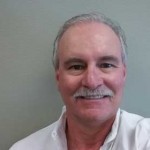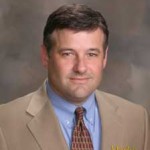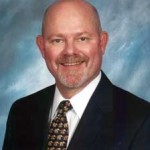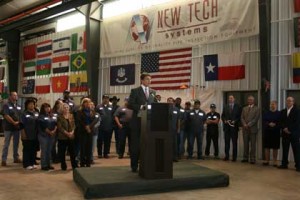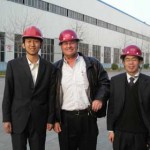In oil and gas fields around the world, there are products in use that wereconceived and constructed in the Permian Basin. And technologies in use that were perfected here as well.
The caller said he was from Israel and needed replacement parts for seals manufactured by Westech Seal, Inc. “How did our parts get over there and how did they find out about us?” wondered company owner Mark Merritt.
He soon learned the trail taken by the parts his Odessa-based company manufactures. The mechanical seals designed for rotating equipment had been purchased by a U.S. company and installed in their equipment with the identifying tags left on the parts. That equipment was shipped to Israel and when the Israeli company needed more seals, they called the name on the tag.
Through a roundabout method, Mark Merritt entered the export business 13 years ago.
Exporting goods and services to the world market is a growing enterprise for Permian Basin businesses. For 10 years, Texas has led the country in exports, with $2.01 billion reported in 2010, and the Permian Basin contributes a growing figure to that number, noted business owner Mark Nicholas, who also serves on the West Texas District Export Council. The council consists of business owners in a region stretching from Amarillo to San Angelo to Abilene and Odessa—business owners who export goods and services.
Permian Basin energy companies, whether they specialize in technology or manufacturing, supply a pool of products sought by the world. “We have some of the best technologies in the world for maximizing mature basins. Other basins in the world are looking to increase their production and people come here looking for ways to do that,” said Larry Richards, president of Hy-Bon Engineering, Inc. His firm provides “leading edge design and fabrication of customized compressor packages for handling low pressure gas streams,” the website notes. This technology applies to gas from oilfield stock tanks, casinghead gas, field gas collection, or biogas from wastewater facilities, digester tanks, landfills, or breweries.
When the economic downturn hit at the end of 2008 and persisted throughout 2009, it was the exporting dimension of several companies that kept those companies’ bottom line in the black.
“Exporting is essential to surviving in this oil industry,” said Pat Hanlon, president of New Tech Systems, which manufactures pipe inspection equipment.
The company opened its doors in 1996 and Hanlon already was familiar with exporting procedures and didn’t have to start at square one. That was beneficial because New Tech’s first contract was with an overseas client—China.
“A lot of companies out here would not have survived in 2008 and 2009 without exporting,” he said. “During those years, as much as 70 percent of our business came from exports. We didn’t have to lay off anyone or cut hours due to our exports. We weren’t in a position to hire new people, but we didn’t have to lay off anyone.”
Hy-Bon Engineering experienced the same situation. Larry Richards came to Hy-Bon as president from another firm that was doing business with 42 countries. The engineering firm was doing some exporting then, but Richards focused on increasing
that figure. Hy-Bon now works with businesses and individuals in India, the Ukraine, Russia, Libya, and several South American countries. With 50 percent of its bottom line pouring in from exported products and services, the firm survived the downturn without suffering a slump.
Exports form a solid base of revenue for numerous West Texas firms, Richards noted. “When oil is $100 a barrel, we all have as much domestic business as we can handle. But when oil is not $100 a barrel we need to have a revenue stream we can depend on, and exports form that base.”
In 2009, when local companies were staring at a standstill economy, Hy-Bon Engineering was busy working on an $8 million job in Venezuela. The company constructed compressor equipment for gas that had been flaring in a small town for 90 years. The gas is now collected and sent to a generator plant that produces electricity for the small town. “That project pulled us through the downturn,” Richards said.
When Merritt and a partner opened Westech Seal, Inc. in Odessa in March 1987, the area was enduring an economic downturn. He had started his own employment with another company manufacturing a similar product when he graduated from college. When the company closed, he and the partner formed Westech Seal. The phone call from Israel opened another path for Merritt, who began to learn about marketing his product and exporting it.
“Yes, China tries to copy it but if the customer wants the best, they come to the U.S.,” he said. Westech still exports seals to Israel and also to Canada and four Middle Eastern countries. “Some parts are used in desalinization plants in the Middle East. They have to run their seawater through desalinization to have anything to drink. They say, ‘Oil is cheap but water is expensive.’”
Hanlon’s New Tech Systems continues to grow its exports. Flags representing the countries that purchase their pipe inspection equipment hang on the walls of the manufacturing facility. When a new country is added, a new flag goes up. “We’re a niche player and we don’t want to play ourselves too thin. We spread out our client base around the world,” he said. That base includes Canada, the Middle East, Asia, India, Southeast Asia, China, and North Africa.
“Each month we ship products to between 10 and 20 different countries,” he said.
In addition, New Tech Systems sends employees overseas to install and train people. “We’re a manufacturer and we have to support the equipment we sell,” Hanlon said. “We send people to install the equipment and provide basic training.”
Recently, employees went to Kazakhstan and China. “We find some technical guys who are adventuresome,” Hanlon said. “They see it as an opportunity to see the world and learn other cultures. Sometimes, though, it is not a bed of roses and the language barrier can be frustrating.”
Other firms are starting the process for exporting. FTS International, based in Fort Worth with Permian Basin offices in Odessa and Artesia, N.M., is an independent provider of well stimulation and completion services for the oil and gas industry. Chief Executive Officer Marc Rowland commented, “We believe that expanding the market internationally for our company’s expertise, services, and manufactured equipment not only strengthens FTSO, but also helps create and sustain U.S. jobs and strengthens the U.S. economy.” Their custom-manufactured high-pressure hydraulic pumps, mobile pumping units, and other equipment could be highly sought after for oil and gas well completions overseas.
The Internet has proven to be a major tool for companies wanting to export. While some companies use it as a communications tool to obtain business and work out details of exporting, Nicholas Consulting Group, Inc., in Midland has completed some projects through the Internet. Mark Nicholas, president of the company, said they provide engineering and design services for grassroots facilities, plant extensions, revamps, retrofits, pipelining, and in-plant services.
“We designed some skids that were sent to Iraq and we have provided consulting services to Pemex,” he said. British Gas in Oman contacted Nicholas Consulting about design work in some of their fields, and the contact came through an employee who used to live in Midland and then went to work for British Gas.
“The engineering work we do is what makes us unique,” Nicholas said.
Several of the business owners recommended contacting the West Texas U.S. Export Assistance Office, located at the Center for Energy and Economic Diversification on FM 1788 between Midland and Odessa, as a means of finding the necessary information and names of other business owners for networking.
Merritt said he discovered “two primary things business owners needs to be aware of. First, getting paid. Second, not running afoul of the U.S. government export policy.”
Payment policies with overseas customers differ from those in the United States. “It takes knowledge and skill to work out getting paid. The terms are different than getting cash in advance,” Merritt said, noting he has always been paid by his overseas customers.
Nicholas took advice from the Export Office and worked with U.S. Embassy personnel when negotiating a contract in Kuwait. “The Embassy usually has commercial service people. One of them sat with me in the conference room while we worked out the terms of getting paid. Even after I left the country, the Embassy fellow could follow up with the company if there was a problem,” he explained.
Prior to September 11, 2001, exporting rules were easier to follow. Since that date, restrictions have tightened. “We can’t ship to a country on the U.S. blacklist,” Merritt said. On the “Do Not Export To” list is Iran. “You can export to another country, like Canada, but Canada doesn’t have a rule against exporting to Iran. We have to make sure what we ship to Canada isn’t going to wind up in Iran. It takes a lot of monitoring.”
Getting to know the customers is a critical component for any of the Permian Basin companies shipping products and services globally. Some businesses make contacts at conferences, such as Nicholas Consulting and New Tech Systems, while Merritt has visited countries to build his relationships.
“I have spent a lot of time in several of the countries building relationships with the customers,” he said. “Once you get out of the United States, a lot of business is done through relationships.”
Hanlon’s company has purchased booth space at several upcoming petroleum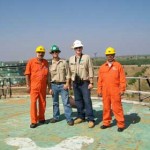 conferences, including the Offshore Technology Conference in Houston April 30 through May 3, the Global Petroleum Show and Conference in Calgary, Canada, June 12-14, the Rio Oil and Gas Expo and Conference in Rio de Janeiro September 17-20, and one in Abu Dhabi.
conferences, including the Offshore Technology Conference in Houston April 30 through May 3, the Global Petroleum Show and Conference in Calgary, Canada, June 12-14, the Rio Oil and Gas Expo and Conference in Rio de Janeiro September 17-20, and one in Abu Dhabi.
The Houston OTC is advertised as attracting over 60,000 visitors and 2,000 exhibitors from around the world. “This is our biggest export conference,” Hanlon said. “We make the most contacts there. I don’t know if I’ve met anyone in the world who doesn’t know about the OTC conference. We get a booth because so many people are looking to make contacts there. Plus, there are people who are wanting to represent you to foreign companies,” Hanlon said.
Nicholas acknowledged he met the Kuwait company client at a trade show, and obtained a job in Lithuania after meeting one of the company’s employees at a conference.
“You need the face-to-face contact first,” Nicholas said. In his case, the rest of the job with Lithuania was accomplished through the Internet.
With his firm’s expertise in design and engineering, NCG Consulting makes contacts at the annual CO2 conference hosted in Midland. “People from all over the world come here for that,” he said.
Networking through the West Texas District Export Council can be a profitable move, the businessmen agreed. Richards with Hy-Bon serves as chair; members include Nicholas, Merritt, and Hanlon, among others.
“A guy called me today wanting information on Pakistan,” Nicholas related. “I didn’t know the answer and contacted a businessman who had been there. West Texas DEC opens business opportunities and allows people to network. You can learn what to expect once you get to a country. Are you going to be sleeping in a tent or a five-star hotel? Before I went to Libya, I learned the hotel where I would be staying had a credit card machine, but it didn’t work. I had to take cash to pay the hotel bill.”
Richards also acknowledged the benefits of the West Texas DEC. “Mistakes can be so costly in some of these international markets.”
DEC schedules periodic seminars for business owners considering exporting.
“Exporting 101 covers issues all exporters needs to be aware of,” Richards said. That includes talks by business owners on their successes and lessons learned, along with being aware of intellectual property theft.
“We have successful projects in more than 30 countries,” said the president of Hy-Bon Engineering. “Our goal is to keep the revenue from exports at 50 percent of our business and to keep a healthy mix of international sales.”
By Lana Cunningham, special contributor










